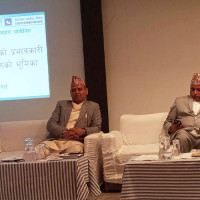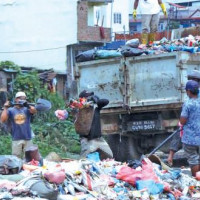- Saturday, 21 February 2026
Dealing With Demands Of Gen Z
“They are seeing revolutionaries as terrorists. This is the government birthed by a revolution, mark my words. The government will do whatever is necessary for good governance,” Minister for Home Affairs Om Prakash Aryal told media persons some days ago.
Aryal’s remarks came at a time when the Sushila Karki-led government has been accused of getting cold feet in bringing the people involved in corruption to book and punishing those responsible for the death of innocent lives during the Gen Z movement on September 8. The Karki government was formed on the foundation of the Gen Z revolt but it has to walk on a tightrope. Prime Minister Karki must reconcile the needs of Gen Z youths with the anxieties of established political parties to ensure her government successfully holds general elections next March.
Vilification
More than a month and a week have gone by since the Gen Z revolution shook the country, but many Gen Zers are fearful that their revolt is losing steam and its achievements will go up in flames if the Karki government fails to take drastic steps to meet their demands. Justifying the uprising and defending its gains have become more challenging for them as they are unorganised and lack a leader who can steer them from confusion to clarity and crisis to stability. Their worries have been further amplified as the established parties who dared to vilify their movement by weaving many conspiracy theories. During their meeting with the President, the leading Gen Z youths have even complained of a physical threat to them.
In the parlance of communism, the Gen Zers fear that a counter-revolution might do away with their dream of establishing clean governance and common prosperity for all Nepalis. Major parties still prefer the restoration of the dissolved parliament to the election. Suppose the House is restored, the country will probably take a new political course. In an interview with a YouTube channel, Prabesh Dahal, an emerging Gen Z leader, said that if the current government were ousted through the House restoration, the Gen Z movement’s achievements would fall into jeopardy.
Amidst this perturbation, Minister Aryal visibly tried to allay Gen Z's worries with his bold remarks. He has clearly demarcated who are revolutionaries and who are not but he declined to name who are terrorists. His statement is a rejoinder to those who have blamed the Gen Zeros for the destruction of public and private properties. It has been widely concurred that there was infiltration in the vandalism, arson and looting on September 9. Youth wings of major political parties, including the Nepali Congress, CPN-UML, and CPN-Maoist Centre, have competed with each other to discredit the Gen Z movement and its leaders, labelling them as disruptive forces. It is imperative that Minister Aryal now acts on his words, so as not to let down the younger generation.
However, a sense of dilemma is besetting the government tasked with restoring order and transferring power to the newly elected representatives. One common agenda of Gen Zers is the guarantee of a directly elected executive head. On Saturday, Gen Z youth Miraj Dhungana said that direct executive and voting rights to all Nepalis working abroad were their bottom line to participate in the election. Their logic is premised on the fact that the country will see greater stability for a given period, which is essential for governance, policy consistency and economic development. On the criticisms that the directly elected head of the government will be more autocratic than the one elected by the parliament, they insist on placing constitutional curbs to keep his/her authoritarian tendencies in check. However, PM Karki has made it clear that she lacks the jurisdiction to go to the extent of amending the constitution and introducing the provision of directly elected executive. This contradiction between the Gen Z youths and the government they formed may complicate the future political course. Similarly, the government is wary of whether its action against those involved in the killing of youths will spoil the atmosphere of the elections. While the Nepali Congress is positive about participating in the elections, the UML is not mentally prepared for it. The UML chair KP Sharma Oli has trivialised the Karki-led government and dismissed a high-level commission formed to investigate the human and physical loss in the Gen Z movement. Oli has run the gauntlet for disparaging the interim government.
In a positive development, the Department of Money Laundering Investigation has started an investigation into the movable and immovable property of three former prime ministers – Sher Bahadur Deuba, KP Sharma Oli and Pushpa Kamal Dahal Prachanda and two ministers – Arzu Rana Deuba and Deepak Khadka. Jaybir Singh Deuba, son of Sher Bahadur Deuba, has also come under the investigation process. The department has corresponded with related institutions, including Nepal Rastra Bank, to provide details of savings, investment, companies and financial transactions of them and their relatives. It has demanded the forensic test reports of burnt banknotes and ashes found in the houses of Deuba, Dahal and Khadka on September 9.
Achievement
This is the first time these leaders are being investigated for money laundering, a move that was unthinkable before the Gen Z movement. Oli, Deuba and Dahal have been in the corridors of power for decades. They have been linked to several big corruption scams that rocked the country in the past. The initiative to bring the big fish into the legal ambit is a noticeable achievement of the Gen Z uprising.
The Karki-led government came into existence not through an election but through a revolution, so it is as powerful as the elected one. It can take sweeping steps to realise the aspirations of the Gen Z youths who sacrificed their lives at the altar of revolution. “The Karki government has been vested with executive rights under Article 75 (2) of the constitution, but it must have the nerve to fulfil the demands of Gen Z youths,” stated former justice of the Supreme Court Balram KC.
(The author is Deputy Executive Editor of this daily.)






-original-thumb.jpg)








